Foreign Festival VS Chinese Traditional Festival
- 格式:doc
- 大小:24.50 KB
- 文档页数:2
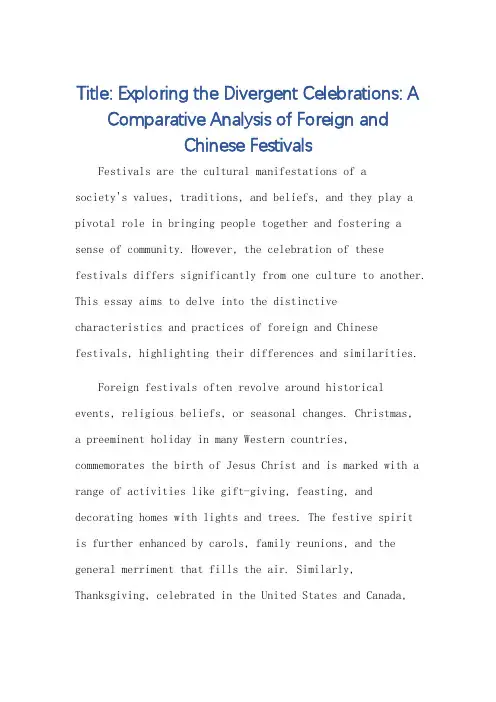
Title: Exploring the Divergent Celebrations: A Comparative Analysis of Foreign andChinese FestivalsFestivals are the cultural manifestations of asociety's values, traditions, and beliefs, and they play a pivotal role in bringing people together and fostering a sense of community. However, the celebration of these festivals differs significantly from one culture to another. This essay aims to delve into the distinctivecharacteristics and practices of foreign and Chinese festivals, highlighting their differences and similarities. Foreign festivals often revolve around historical events, religious beliefs, or seasonal changes. Christmas,a preeminent holiday in many Western countries, commemorates the birth of Jesus Christ and is marked with a range of activities like gift-giving, feasting, and decorating homes with lights and trees. The festive spiritis further enhanced by carols, family reunions, and the general merriment that fills the air. Similarly, Thanksgiving, celebrated in the United States and Canada,is a time for giving thanks for the year's bounty, often marked by a traditional meal shared with family and friends. On the other hand, Chinese festivals are deeply rootedin ancient traditions and often have agricultural or mythical origins. The Spring Festival, also known as Chinese New Year, is the most important and widely celebrated holiday in China. It marks the beginning of anew lunar year and is a time for family reunions, feasting, and the exchange of greetings. The festival is also notable for its various customs like setting off fireworks, giving red envelopes, and performing lion and dragon dances. Mid-Autumn Festival, another significant holiday, is associated with the moon and is often celebrated with mooncake-eating, lantern-lighting, and family gatherings.One significant difference between foreign and Chinese festivals lies in their focus. Foreign festivals tend to emphasize individual expressions of joy and gratitude, with a strong emphasis on personal relationships and family reunions. Chinese festivals, by contrast, often have a stronger collective and cultural significance, reflectingthe values of harmony, unity, and respect for tradition.This is evident in the way Chinese festivals are celebrated, often involving the entire community in various rituals and activities.Moreover, the role of food in festivals also differs.In foreign festivals, food is often a means of sharing and expressing love and gratitude, with specific dishes associated with particular holidays. In Chinese festivals, however, food plays a more central role, often serving as a symbol of prosperity, fertility, and good luck. The preparation and sharing of traditional dishes are integralto the festive atmosphere, reflecting the importance offood culture in Chinese society.Another notable difference is the significance of mythology and folklore in Chinese festivals. Many Chinese holidays are associated with mythical stories or legends, adding a layer of mystery and enchantment to the celebrations. By contrast, foreign festivals tend to have a more secular or religious focus, with their origins often rooted in historical events or religious beliefs.In conclusion, the comparison of foreign and Chinese festivals reveals a rich tapestry of cultural practices andtraditions. While both cultures share a common thread of celebration and community-building, the specific ways in which they commemorate their festivals reflect their unique historical, religious, and social backgrounds. Thisdiversity adds to the charm and fascination of festivals, making them a powerful tool for understanding and appreciating the vast array of human cultures and beliefs.**节日庆祝的差异性探究:中外节日对比分析**节日是社会价值观、传统和信仰的文化表现,对于凝聚人心、促进社区和谐起着至关重要的作用。
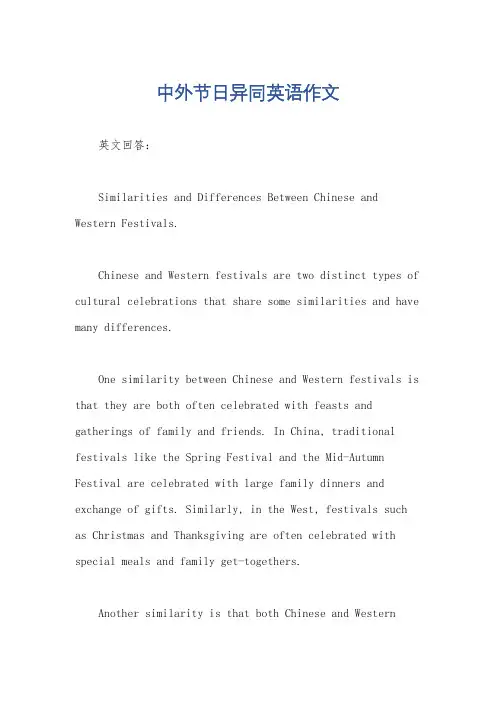
中外节日异同英语作文英文回答:Similarities and Differences Between Chinese and Western Festivals.Chinese and Western festivals are two distinct types of cultural celebrations that share some similarities and have many differences.One similarity between Chinese and Western festivals is that they are both often celebrated with feasts and gatherings of family and friends. In China, traditional festivals like the Spring Festival and the Mid-Autumn Festival are celebrated with large family dinners and exchange of gifts. Similarly, in the West, festivals such as Christmas and Thanksgiving are often celebrated with special meals and family get-togethers.Another similarity is that both Chinese and Westernfestivals often involve traditional music and dance. In China, traditional festivals are often accompanied bylively lion dances, dragon dances, and opera performances. In the West, festivals like Christmas and Easter often feature carols, hymns, and traditional folk dances.However, there are also many differences between Chinese and Western festivals. One of the most significant differences is the timing of the festivals. Chinese festivals are often based on the lunar calendar, while Western festivals follow the solar calendar. This meansthat the dates of Chinese festivals change from year to year, while the dates of Western festivals remain the same.Another difference is the purpose or significance of the festivals. Chinese festivals are often rooted in Chinese history, mythology, and religious beliefs. For example, the Spring Festival celebrates the beginning of the new year according to the lunar calendar, while theMid-Autumn Festival celebrates the harvest and the moon. In contrast, Western festivals are often based on Christian or other religious beliefs. For example, Christmas celebratesthe birth of Jesus Christ, while Easter celebrates his resurrection.Finally, there are differences in the way that Chinese and Western festivals are celebrated. Chinese festivals are often celebrated publicly with large-scale events and displays. For example, the Spring Festival is celebrated with fireworks, parades, and traditional performances. In contrast, Western festivals are often celebrated privately within families and communities. For example, Christmas is often celebrated with a family gathering around a decorated Christmas tree.中文回答:中国和西方节日异同。
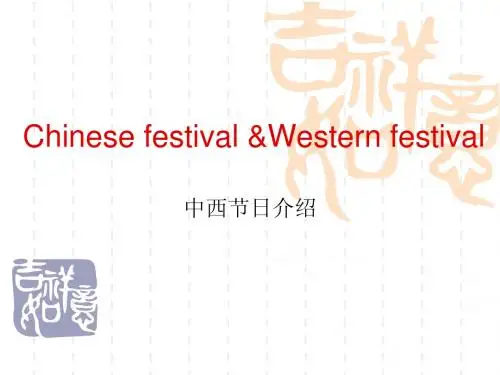
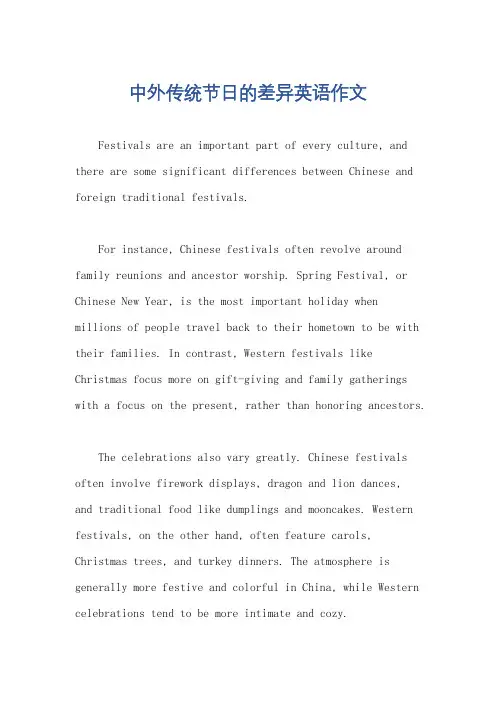
中外传统节日的差异英语作文Festivals are an important part of every culture, and there are some significant differences between Chinese and foreign traditional festivals.For instance, Chinese festivals often revolve around family reunions and ancestor worship. Spring Festival, or Chinese New Year, is the most important holiday whenmillions of people travel back to their hometown to be with their families. In contrast, Western festivals like Christmas focus more on gift-giving and family gatherings with a focus on the present, rather than honoring ancestors.The celebrations also vary greatly. Chinese festivals often involve firework displays, dragon and lion dances,and traditional food like dumplings and mooncakes. Western festivals, on the other hand, often feature carols, Christmas trees, and turkey dinners. The atmosphere is generally more festive and colorful in China, while Western celebrations tend to be more intimate and cozy.Another difference is the significance of each festival. Chinese festivals are often tied to the lunar calendar and the agricultural cycle, marking important moments like the beginning of spring or the harvest. Western festivals, like Easter and Halloween, often have religious origins and symbolize important events in Christian history.And let's not forget the duration of festivals. Chinese festivals can last for weeks, with.。
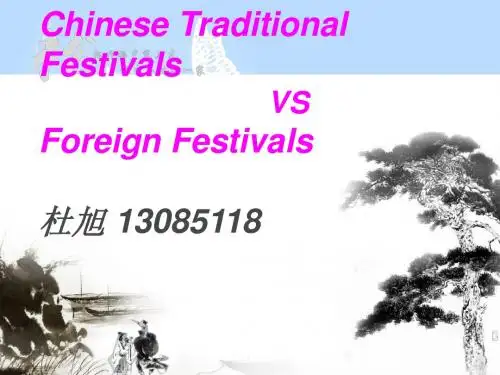
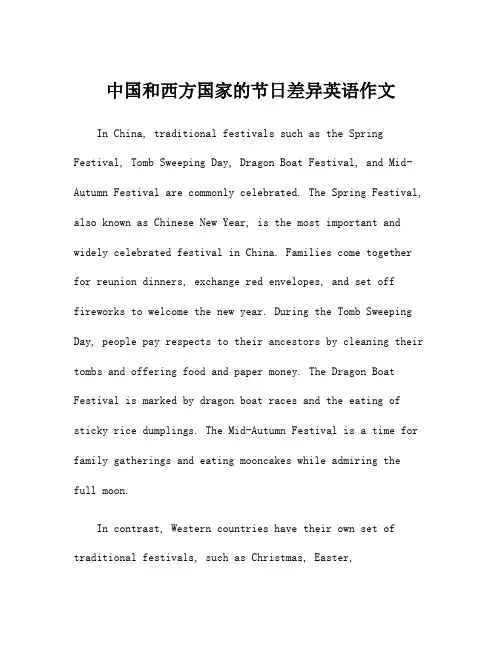
中国和西方国家的节日差异英语作文In China, traditional festivals such as the Spring Festival, Tomb Sweeping Day, Dragon Boat Festival, and Mid-Autumn Festival are commonly celebrated. The Spring Festival, also known as Chinese New Year, is the most important and widely celebrated festival in China. Families come together for reunion dinners, exchange red envelopes, and set off fireworks to welcome the new year. During the Tomb Sweeping Day, people pay respects to their ancestors by cleaning their tombs and offering food and paper money. The Dragon Boat Festival is marked by dragon boat races and the eating of sticky rice dumplings. The Mid-Autumn Festival is a time for family gatherings and eating mooncakes while admiring thefull moon.In contrast, Western countries have their own set of traditional festivals, such as Christmas, Easter,Thanksgiving, and Halloween. Christmas is a major holiday in Western countries, characterized by the exchange of gifts, festive decorations, and family gatherings. Easter is a religious holiday that celebrates the resurrection of Jesus Christ, often marked by church services and Easter egg hunts. Thanksgiving is a time for families to come together and give thanks for the blessings of the past year, often accompanied by a large feast. Halloween is a time for dressing up in costumes, trick-or-treating, and decorating homes with spooky themes.One key difference between Chinese and Western festivals is the emphasis on family and tradition. In China, festivals are often a time for families to come together and observe age-old customs and rituals. There is a strong sense of reverence for ancestors and the passing down of cultural heritage. In Western countries, festivals also involve family gatherings, but they are often less focused on traditional customs and more on socializing and entertainment.Another difference is the religious significance of certain festivals. Many Western festivals have religious origins and are still observed with a degree of religious reverence. In contrast, Chinese festivals are often rooted in traditional culture and mythology, with less emphasis on religious practices.Additionally, the way festivals are celebrated also differs between China and Western countries. Chinesefestivals often involve specific activities and customs, such as eating certain foods, performing traditional dances, or participating in ceremonial rituals. Western festivals, on the other hand, often involve more varied forms of celebration, such as gift-giving, feasting, and public events like parades and fireworks.Overall, while there are some similarities in the way festivals are celebrated in both China and Western countries, there are also notable differences in terms of culturalsignificance, religious influence, and the specific customs and traditions associated with each festival. These differences reflect the unique cultural and historical backgrounds of each region, and contribute to the richness and diversity of global festival traditions.。
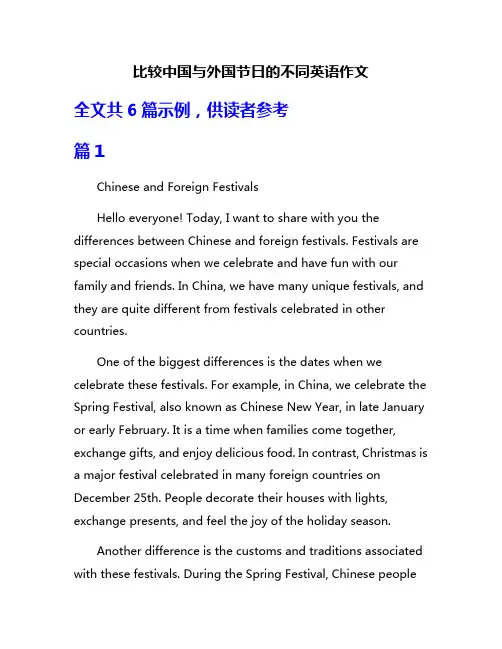
比较中国与外国节日的不同英语作文全文共6篇示例,供读者参考篇1Chinese and Foreign FestivalsHello everyone! Today, I want to share with you the differences between Chinese and foreign festivals. Festivals are special occasions when we celebrate and have fun with our family and friends. In China, we have many unique festivals, and they are quite different from festivals celebrated in other countries.One of the biggest differences is the dates when we celebrate these festivals. For example, in China, we celebrate the Spring Festival, also known as Chinese New Year, in late January or early February. It is a time when families come together, exchange gifts, and enjoy delicious food. In contrast, Christmas is a major festival celebrated in many foreign countries on December 25th. People decorate their houses with lights, exchange presents, and feel the joy of the holiday season.Another difference is the customs and traditions associated with these festivals. During the Spring Festival, Chinese peopleoften set off fireworks and firecrackers to scare away evil spirits. We also have a tradition called "giving red envelopes." Elders give red envelopes filled with money to children, which is considered lucky. On the other hand, during Halloween in foreign countries, children dress up in costumes and gotrick-or-treating, knocking on doors and asking for candy. It's a fun and spooky holiday!Food also plays an important role in both Chinese and foreign festivals. In China, we have special dishes for different festivals. For example, during the Mid-Autumn Festival, we eat mooncakes, which are round pastries filled with sweet or savory fillings. Mooncakes symbolize family reunion and are shared among family members. In foreign countries, Thanksgiving is a major festival where people express gratitude for the harvest and blessings of the past year. They have a traditional meal that includes turkey, cranberry sauce, and pumpkin pie.Furthermore, the activities we engage in during these festivals are different too. During the Dragon Boat Festival in China, people participate in dragon boat races. Dragon boats are long, narrow boats decorated like dragons, and it's exciting to watch teams paddle together to win the race. In foreign countries, Easter is a festival where children have an Easter egghunt. They search for colorful eggs hidden in gardens or parks, and it's so much fun to find them!In conclusion, Chinese and foreign festivals have many differences. They vary in terms of the dates they are celebrated, the customs and traditions associated with them, the food we eat, and the activities we participate in. Festivals are a wonderful way to learn about different cultures and traditions. Whether it's celebrating Chinese New Year or Christmas, the most important thing is to spend time with our loved ones and create beautiful memories together.篇2My Favorite HolidaysHolidays are the best! They're a time when we get to take a break from school, spend time with family and friends, and celebrate special occasions. Different countries and cultures have their own unique holidays, and I find it really interesting to learn about them.In China, where I'm from, we have a lot of exciting holidays throughout the year. One of my favorites is Chinese New Year, which usually falls in late January or early February. It's a time for family reunions, fireworks, delicious food, and giving out redenvelopes with money inside (which is always super exciting for kids like me!).During Chinese New Year, we decorate our homes with red lanterns, couplets, and paper cuttings. My grandma always tells me stories about the mythical beast Nian who was scared away by the color red and loud noises like firecrackers. That's why we have so many red decorations and fireworks during this festival.Another big holiday in China is the Mid-Autumn Festival, which celebrates the autumn harvest. We eat mooncakes, which are dense, sweet pastries filled with lotus seed paste or other fillings. My favorite part is carrying brightly lit lanterns and watching the full moon with my family.In contrast, some of the major holidays in Western countries like the United States and the United Kingdom are quite different. For example, Christmas is a huge deal in those countries. People decorate their homes with Christmas trees, lights, and other festive decorations. Santa Claus is a big part of the celebration, and children leave out cookies and milk for him on Christmas Eve.On Christmas Day, families gather to exchange gifts and enjoy a special meal together. It's a time for spreading joy and goodwill, which I think is really nice. However, the cold winterweather and lack of fireworks make it quite different from the Chinese New Year celebrations I'm used to.Another popular Western holiday is Halloween, which falls on October 31st every year. Kids dress up in costumes, often as ghosts, witches, or superheroes, and go trick-or-treating, knocking on doors in their neighborhood to collect candy. The spooky decorations and jack-o-lanterns (carved pumpkins) are really cool, but I must admit, the whole idea of dressing up as scary creatures is a bit strange to me.Thanksgiving is another major holiday in the United States, celebrated in November. It's a time to give thanks for the blessings of the past year and enjoy a big feast with family and friends. Traditionally, the main dish is roasted turkey, along with sides like mashed potatoes, cranberry sauce, and pumpkin pie. It's a cozy, family-oriented holiday, but without the flashy decorations and fireworks that we have in Chinese celebrations.While the holidays in different countries may seem quite different on the surface, I think they all share a common theme of bringing people together to celebrate and create lasting memories. Whether it's watching fireworks on Chinese New Year, exchanging gifts on Christmas, or enjoying a big meal on Thanksgiving, these special occasions give us a chance to spendquality time with our loved ones and appreciate the important things in life.I feel lucky to have been exposed to both Chinese and Western holiday traditions. It's fascinating to learn about the unique customs, foods, and traditions associated with each celebration. While the specifics may vary, the underlying spirit of joy, togetherness, and gratitude is universal.As I grow older, I look forward to experiencing even more holidays and learning about the diverse cultural traditions around the world. After all, what could be better than having more reasons to celebrate, eat delicious food, and make wonderful memories with the people you love?篇3Chinese and Foreign Festivals: What Makes Them Different?Hello, everyone! Today, I want to tell you about the differences between Chinese and foreign festivals. Festivals are special times when people come together to celebrate and have fun. Every country has its own unique festivals, and China and foreign countries are no exception. Let's explore the exciting world of festivals together!Chinese FestivalsIn China, we have many traditional festivals that have been celebrated for thousands of years. One of the most important festivals is the Spring Festival, also known as Chinese New Year. It usually falls in late January or early February. During this festival, families gather together, eat delicious food, and exchange red envelopes with money inside. We also have beautiful fireworks that light up the sky and dragon dances that bring good luck.Another famous Chinese festival is the Mid-Autumn Festival, which takes place on the 15th day of the eighth lunar month. It is a time for family reunions and moon appreciation. We eat mooncakes, which are round pastries filled with sweet or savory fillings, and we light lanterns to celebrate this special occasion.Foreign FestivalsNow, let's explore some festivals celebrated in foreign countries. One popular festival is Christmas, which is celebrated on December 25th. It is a time when Christians around the world celebrate the birth of Jesus Christ. People decorate their homes with colorful lights, put up Christmas trees, and exchange gifts with their loved ones. Santa Claus, a kind old man in a red suit, brings presents to children who have been good throughout the year.In the United States, there is a festival called Thanksgiving. It is celebrated on the fourth Thursday of November. During this festival, families gather together and give thanks for the blessings in their lives. They enjoy a big feast that usually includes roasted turkey, mashed potatoes, and pumpkin pie. It's a time to be grateful and show appreciation to others.The DifferencesNow that we have learned about some Chinese and foreign festivals, let's talk about the differences between them. One major difference is the time of celebration. Chinese festivals are often based on the lunar篇4Holidays Around the WorldHi, my name is Lily, and I'm a student in elementary school. I love holidays because they mean no school and lots of fun! But did you know that different countries have different holidays? I find it really interesting to learn about the special days that people celebrate in other parts of the world.Let's start with China, my home country. We have some really cool holidays here! My favorite is definitely Chinese NewYear, also known as the Spring Festival. It's the biggest and most important celebration of the year. Everything gets decorated with red lanterns, and there are dragon dances and fireworks everywhere. My grandparents give me and my brother little red envelopes filled with money, which is always exciting!During Chinese New Year, we have a special dinner with all our family members. The table is loaded with delicious dishes like dumplings, noodles, and sweet rice balls. After dinner, we stay up late to watch the New Year's Gala on TV. It's a huge variety show with singing, dancing, comedy skits, and more. I love trying to stay awake until midnight when the new year officially begins!Another fun Chinese holiday is the Mid-Autumn Festival. We eat mooncakes, which are these dense, sweet pastries with different fillings like lotus seed paste or red bean paste. They're supposed to be shaped like the full moon. My favorite part is carrying lanterns and parading through the streets with my friends. Some of the lanterns are so beautifully crafted and colorful!Now let's talk about holidays in other countries. One of the biggest celebrations in the United States is Christmas. American kids get really excited because they believe a guy called SantaClaus brings them presents on Christmas Eve. They leave out cookies and milk for him, and hang up stockings by the fireplace.On Christmas Day, families gather together to open gifts and have a big feast with dishes like roast turkey, mashed potatoes, and pumpkin pie. I've seen pictures of their houses all decorated with twinkling lights, Christmas trees, and other festive decorations. It looks like a lot of fun, but I think I prefer our Chinese holidays.In India, one of the biggest festivals is called Diwali, the Festival of Lights. People decorate their homes with little oil lamps called diyas, and there are fireworks shows everywhere. It's similar to our Lantern Festival, but it celebrates the victory of light over darkness.During Diwali, Indian families also exchange gifts and have big feasts with dishes like curry, samosas, and sweet desserts. I've seen videos of the beautiful rangoli designs that they create on the ground using colored powders. They look like intricate patterns and pictures made out of sand or rice. So creative!Over in Japan, one unique holiday is called Obon. It's a Buddhist festival where people honor the spirits of their ancestors. They clean and decorate their family graves, and some even leave篇5Chinese and Foreign Festivals: A ComparisonHello everyone! Today, I want to share with you some interesting differences between Chinese and foreign festivals. Festivals are special days that people celebrate in different countries. They are filled with fun, traditions, and happiness. Let's explore how Chinese and foreign festivals are different!Chinese FestivalsIn China, we celebrate many unique festivals throughout the year. One of the most important festivals is the Spring Festival, also known as Chinese New Year. It usually falls in January or February. During this festival, families get together, exchange gifts, and have a big feast. We also have a tradition of giving red envelopes with money to children for good luck.Another famous festival is the Mid-Autumn Festival. It takes place in September or October. On this day, we enjoy mooncakes, which are delicious pastries filled with sweet bean paste or lotus seed paste. We also appreciate the full moon and spend time with our families.Foreign FestivalsNow, let's talk about some festivals celebrated in foreign countries. One popular festival is Christmas, which is celebrated in many countries around the world. It falls on December 25th and is a time when people decorate their homes, exchange gifts, and spend time with their loved ones. Santa Claus, with his big white beard and red suit, brings gifts for children. Snow, Christmas trees, and carol singing are also important parts of this festival.In the United States, Thanksgiving is a significant festival. It is celebrated on the fourth Thursday in November. Families gather to express gratitude for the blessings in their lives. They enjoy a delicious meal together, which usually includes a roasted turkey, mashed potatoes, and pumpkin pie. It's a day to appreciate family, friends, and the good things in life.DifferencesChinese and foreign festivals have some interesting differences. One major difference is the time they are celebrated. Chinese festivals are based on the lunar calendar, while foreign festivals follow the Gregorian calendar. This means that the dates of Chinese festivals change every year, while foreign festivals have fixed dates.Another difference is the types of food eaten during festivals. In China, we have special dishes like dumplings during the Spring Festival and mooncakes during the Mid-Autumn Festival. In contrast, foreign festivals often have specific traditional foods. For example, Americans have turkey on Thanksgiving, and people in many countries have chocolate eggs on Easter.Cultural activities and customs also vary between Chinese and foreign festivals. In China, we have dragon and lion dances during the Spring Festival, where performers wear colorful costumes and dance in the streets. Foreign festivals may have parades, fireworks, or special religious ceremonies. For instance, during Diwali in India, people light oil lamps and fireworks to celebrate the victory of light over darkness.ConclusionIn conclusion, Chinese and foreign festivals have their own unique characteristics. Chinese festivals, such as the Spring Festival and the Mid-Autumn Festival, are based on the lunar calendar and involve special food and cultural activities. Foreign festivals like Christmas and Thanksgiving have fixed dates, traditional foods, and their own customs. Festivals bring joy, unity, and a sense of belonging to people around the world, no matter where they are celebrated.I hope you enjoyed learning about the differences between Chinese and foreign festivals. Festivals are a great way to understand different cultures and appreciate the diversity in the world. Let's continue to celebrate and learn about festivals from different countries!篇6Celebrating Festivals: China vs. Foreign CountriesHi everyone! Today, I want to share with you the differences between festivals in China and foreign countries. Festivals are special times when people come together to celebrate, have fun, and learn about their culture. Let's explore the exciting contrasts between Chinese festivals and those celebrated in other parts of the world!Chinese FestivalsChina is a country with a rich history and diverse culture, and its festivals reflect this uniqueness. Here are a few popular Chinese festivals:Chinese New YearChinese New Year, also known as Spring Festival, is the most important festival in China. It marks the beginning of the lunarcalendar year. During this festival, families gather to have a big reunion dinner. We also decorate our homes with red lanterns and paper cuttings. The highlight of Chinese New Year is the lion and dragon dances, where performers wear colorful costumes and dance to the beat of drums and cymbals.Mid-Autumn FestivalThe Mid-Autumn Festival is another significant festival in China. It celebrates the harvest season and the full moon. Families come together to enjoy mooncakes, delicious round pastries filled with sweet bean paste or lotus seed paste. We also light lanterns and have a special tradition of gazing at the moon and sharing stories.Foreign FestivalsNow, let's explore some festivals celebrated in foreign countries and see how they differ from Chinese festivals!ChristmasChristmas is a widely celebrated festival in many countries, especially in Western countries. It is a time to celebrate the birth of Jesus Christ. People decorate Christmas trees, exchange gifts, and have a festive feast with their loved ones. Santa Claus, a jollyman in a red suit, brings gifts to children. Christmas carols are sung, and people attend special church services.HalloweenHalloween is a spooky festival celebrated mainly in the United States and some other Western countries. It falls on October 31st. People dress up in costumes like ghosts, witches, and superheroes. They go trick-or-treating, which means going from house to house, knocking on doors, and asking for candies. Pumpkins are carved into funny or scary faces, and scary stories are shared.ThanksgivingThanksgiving is a significant festival in the United States, Canada, and some other countries. It is a time to express。
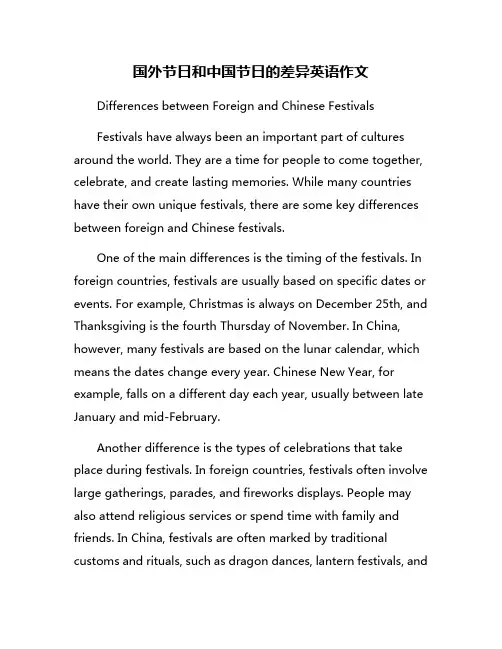
国外节日和中国节日的差异英语作文Differences between Foreign and Chinese FestivalsFestivals have always been an important part of cultures around the world. They are a time for people to come together, celebrate, and create lasting memories. While many countries have their own unique festivals, there are some key differences between foreign and Chinese festivals.One of the main differences is the timing of the festivals. In foreign countries, festivals are usually based on specific dates or events. For example, Christmas is always on December 25th, and Thanksgiving is the fourth Thursday of November. In China, however, many festivals are based on the lunar calendar, which means the dates change every year. Chinese New Year, for example, falls on a different day each year, usually between late January and mid-February.Another difference is the types of celebrations that take place during festivals. In foreign countries, festivals often involve large gatherings, parades, and fireworks displays. People may also attend religious services or spend time with family and friends. In China, festivals are often marked by traditional customs and rituals, such as dragon dances, lantern festivals, andfood offerings to ancestors. These practices have been passed down through generations and are an important part of Chinese cultural heritage.The significance of festivals also differs between foreign and Chinese cultures. In many Western countries, festivals are often seen as a time for relaxation and enjoyment. People may take time off work, exchange gifts, and indulge in feasting and entertainment. In China, festivals are more closely tied to religious beliefs and historical events. Many festivals have deep cultural meanings and are seen as a time to honor ancestors, seek blessings for the future, and strengthen community ties.In terms of food, foreign and Chinese festivals also have distinct culinary traditions. In Western countries, festive meals often include dishes like turkey, ham, pumpkin pie, and chocolate eggs. In China, festival foods are typically symbolic and may vary depending on the region. For example, during the Mid-Autumn Festival, mooncakes are a popular treat, while dumplings are a must-have dish for Chinese New Year.Overall, while there are similarities in the way festivals are celebrated around the world, there are also unique differences that reflect the diverse cultures and customs of each country. Whether it's gathering with loved ones, reflecting on the past, orlooking towards the future, festivals play an important role in bringing people together and celebrating the richness of human experience.。
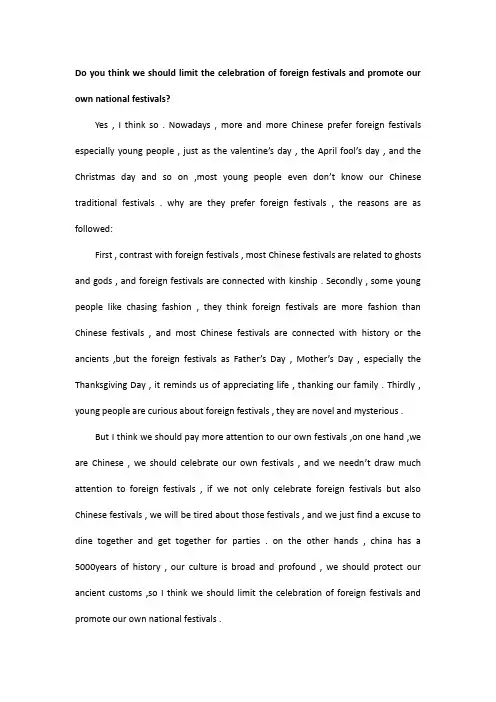
Do you think we should limit the celebration of foreign festivals and promote our own national festivals?Yes , I think so . Nowadays , more and more Chinese prefer foreign festivals especially young people , just as the valentine’s day , the April fool’s day , and the Christmas day and so on ,most young people even don’t know our Chinese traditional festivals . why are they prefer foreign festivals , the reasons are as followed:First , contrast with foreign festivals , most Chinese festivals are related to ghosts and gods , and foreign festivals are connected with kinship . Secondly , some young people like chasing fashion , they think foreign festivals are more fashion than Chinese festivals , and most Chinese festivals are connected with history or the ancients ,but the foreign festivals as Father’s Day , Mother’s Day , especially the Thanksgiving Day , it reminds us of appreciating life , thanking our family . Thirdly , young people are curious about foreign festivals , they are novel and mysterious .But I think we should pay more attention to our own festivals ,on one hand ,we are Chinese , we should celebrate our own festivals , and we needn’t draw much attention to foreign festivals , if we not only celebrate foreign festivals but also Chinese festivals , we will be tired about those festivals , and we just find a excuse to dine together and get together for parties . on the other hands , china has a 5000years of history , our culture is broad and profound , we should protect our ancient customs ,so I think we should limit the celebration of foreign festivals and promote our own national festivals .。
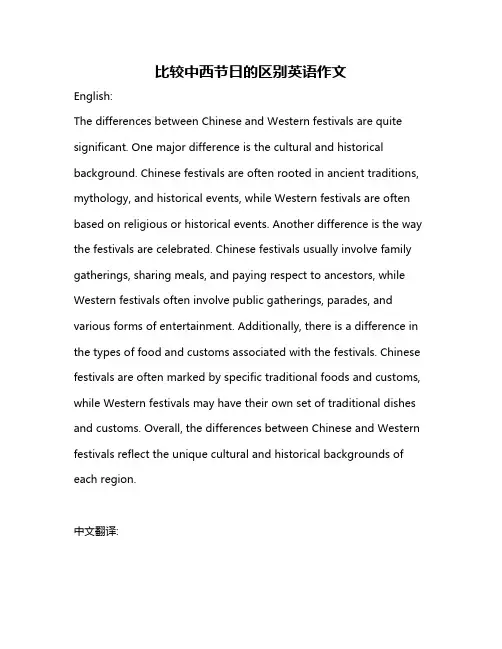
比较中西节日的区别英语作文English:The differences between Chinese and Western festivals are quite significant. One major difference is the cultural and historical background. Chinese festivals are often rooted in ancient traditions, mythology, and historical events, while Western festivals are often based on religious or historical events. Another difference is the way the festivals are celebrated. Chinese festivals usually involve family gatherings, sharing meals, and paying respect to ancestors, while Western festivals often involve public gatherings, parades, and various forms of entertainment. Additionally, there is a difference in the types of food and customs associated with the festivals. Chinese festivals are often marked by specific traditional foods and customs, while Western festivals may have their own set of traditional dishes and customs. Overall, the differences between Chinese and Western festivals reflect the unique cultural and historical backgrounds of each region.中文翻译:中国和西方节日的不同之处是非常明显的。
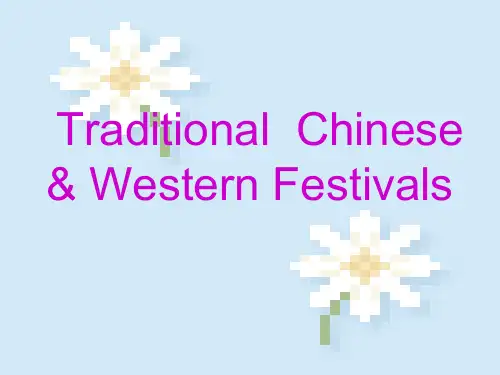
位敦市安定阳光实验学校长中学高三英语二轮复习书面表达复习话题指导专题04 传统文化话题指导(教师)写作任务:假如你是李明,你的朋友Bob来信表示对中国文化特别感兴趣,尤其想知道中国人是如何欢度的。
请你给他写一封回信介绍有关情况。
(词数:不少于120)Eve, the whole family usually get together to have dumplings, set off fireworks, and watch TV programs. On the New Year’s Day, people always get up early and put on new clothes. Everyone looks happy and says "Happy New Year" to each other. Children can also get lucky money from their parents and other adults. When you take a walk in the streets, you will be struck by the sight of beautiful decorations. Some doors are decorated with red lanterns. This is something about our Spring Festival. And welcome to our country some day.Best wishes.成稿:Dear Bob,I’ve received your letter, and I’m glad to hear that you are very interested in our traditions, such as the Spring Festival.The Spring Festival is one of the most important traditional festivals in China. Both adults and children look forward to this great day, just like Christmas Day in the West. Several days before it, people are busy shopping and cleaning. The night before, the whole family usually gets together to have dumplings, set off fire-works, and watch TV. On New Year’s Day, people always get up early and put on new clothes. Everyone looks happy and says "Happy new year" to each other. I like the Spring Festival because I can get lucky money from my elders. Walking down the street, you will see many beautiful decorations. Many homes are decorated with red lanterns and other things.Isn’t the Spring Festival interesting? I’m sure that you will love it. I hope you can join us during a Spring Festival.Best wishes.Yours,Li MingPowerful Sentences:1. It is a time for rest and relaxation. Children spend their time playing and having fun.2. It is a delightful time for everyone, especially for those who have been working very hard for the whole year.3. Public places are filled with people of all ages. Many people go traveling during the holiday.4. In the daytime, there are many kinds of activities, such as visiting friends and relatives, and going to parks and temples.实例指导2—的节日习俗及文化写作任务:假设你是英语爱好者的会员,近期此即将筹备一场会员聚会,主题是了解的节日习俗及文化。
中西节日文化差异探究Festivals, whether in China or abroad, play a vitalrole in the cultural identity and heritage of a society. However, there exist profound differences between Chinese and foreign festivals in terms of their origins, celebrations, and meanings. This essay aims to explore these differences and highlight the unique characteristics of both Chinese and foreign festivals.OriginsChinese festivals often have a strong historical and cultural background, many of which are rooted in ancient traditions and legends. For instance, the Spring Festival, also known as Chinese New Year, is the most important traditional holiday in China. It marks the beginning of a new lunar year and is associated with various legends, such as the story of the monster "Nian" and the red envelopes to ward off evil spirits.On the other hand, foreign festivals often originate from religious beliefs or commemorations of historical events. Christmas, for example, is a major holiday inWestern countries, celebrating the birth of Jesus Christ. It is deeply rooted in Christianity and is marked by a range of religious rituals and traditions.CelebrationsChinese festivals are typically family-oriented, with families coming together to enjoy a reunion dinner and exchange gifts. The Spring Festival, for instance, is marked by a festive atmosphere with fireworks, dragon dances, and family gatherings. In contrast, foreign festivals, especially those in Western countries, tend to be more focused on community and social gatherings. Christmas, for instance, is often celebrated with caroling, gift-giving, and festive装饰, creating a warm and joyful atmosphere.MeaningsChinese festivals often carry profound cultural and philosophical meanings. The Mid-Autumn Festival, for instance, celebrates the full moon and is a time for family reunions, symbolizing harmony and unity. Foreign festivals, on the other hand, often emphasize the values of love, peace, and giving. Christmas, for example, commemorates thebirth of Jesus Christ and is a time for giving gifts and sharing joy with loved ones.ConclusionIn conclusion, Chinese and foreign festivals differ significantly in terms of their origins, celebrations, and meanings. Chinese festivals are deeply rooted in history and culture, emphasizing family reunions and harmonious relationships. Foreign festivals, on the other hand, often have religious or historical backgrounds, focusing on community gatherings and the values of love and giving. Despite these differences, however, both Chinese andforeign festivals serve as important cultural bridges, connecting people across different cultures and traditions. **中西节日文化差异探究**节日,无论是在中国还是外国,都在一个社会的文化认同和传承中扮演着至关重要的角色。
中西方传统节日对比英语作文Second English papersEach nation has its own characteristic festivals thatreflect the culture of itself.In China, asour country andHowever,some western festivals sometimes even more popular than traditional festivals,foreign cultural’s influence should not be underestimated.The main The main group of celebratingwesternfestivals is youth group which takes students as the main force.People celebrate festivals such as Valentine's day, mother's day, Thanksgiving Day and Christmas Day. In fact,because of the Chinese way of thinking,western holidays in China is just popular for Christmas and Valentine's day, not all western holidays attract people's attention.According to a survey ofCentral China Normal University,many college students know the existence of western festivals,but little of them know about their cultural connotations.In addition to Christmas,respondents who knowother western f estivals’meaning are less than 10%.Referring to the way to celebrating,in General,during the Festival,people send gifts such as flowers and greeting cards.They sing with friends, and blessor send messages to each other;lots of people are going to relax during the festival: shopping, inviting friends to restaurants,dancing,and so on.On thewhole,Chinese celebrate western holidays with the following faith fouranda characteristics:passion for universality,particularity,blindconsumptionAs the saying goes,1000readers have 1000Hamlets inmind.people have different viewson whether Chinese should celebrate western holidays.Some people who are keen on Western festivals,argued that China's traditional festivals are too rigidand there are many festivals with feudal thinking.On the contrary,westernfestivalswhichflamboyantand reflect are excitingadvocateOpponents believe thatChina has its own history and local culture for thousands of years,the Western Festival don’t suit China's needs for cultural development.Also,due to blind worship,people often losttraditional culture. Celebratingwestern holidayswill shake the traditional culture’sstatus in the minds of nationals and endanger the inheritance and development of traditional culture.For example,many young people celebrate Valentine's day,but they don't knowChinese Lovers’s Day.In addition,owing to the cultural invasion,many countries arewary of foreign holidays .Toguarantee Chinese cultural’s independence,western holidays cann’t be allowed to develop freely.At the same time,many people celebrate Western festivals for following the fashion .Theeffectof cultural exchanges isn’t obvious.In addition,the blind pursuit of consumption and enjoyment causesmoney worship,hedonism and other bad ideas.Just my personal opinion,we should celebrate western holid ays withrational thought,and we shouldn’t lose ourselves.Towards western Festivals, we should take its essence and discard the dregs.For instance,ThanksgivingDaycan be advocated for making our culture advance as it reflects one of Chinese traditional virtues-gratefulness;others,such as Halloween,should be treated calmly because it’s religious.Cultural integration is the trend of the historical development.So we should not implement "isolationism".Under the premise of enhancing awareness of traditional culture and revitalizing Chinese culture, we can activelyenter the world that has frequent cultural exchanges.Festivalsare important means of cultural transmission which host the important cultural.They’re the crystalliz ation of human wisdom. Rich festival lights up our lives, for our life has various colors. Let us take the broad mindandappreciate the colorful festivals!。
中西方节日文化差异英文作文Culture Differences of Chinese and Western Traditional FestivalAbstractTraditional festivals are the historical products of a nation’s development. Whether in China which has a long history of more than five thousand years or in the newborn America, the origination of traditional festivals in the two countries is similar. Most traditional festivals originated from people’s expectation for harvest in the agricultural production, the worship towards the gods and the nature, sacrifices to the historical characters and etc. After the long-term evolution, traditional festivals have become an indispensable part of the national culture. Through traditional festivals, the distinct cultural characteristics of a people and the national spirits can be observed. Since the ancient time, China has been a large agricultural country, the small-scale economic mode known as ―The men plough and the women weave‖ initiated the agricultural civilization of Chinesecharacteristics. Chinese traditional festivals are deeply rooted in the agricultural civilization and greatly influenced by Confucianism. To some extent, Chinese traditional festivals have relieved from the primitive taboos and tended to be happy festivals which reflect the concept of harmony and integration in Confucianism. In America, religion plays a very important role in people’s life. With various branches, the religious system of America is quite complicated, among which Christianity is of the greatest importance. Some American traditional festivals are the direct products of Christianity and most festivals have evolved into the religious festivals later. This paper is designed to discuss the differences in customs, origins and other aspects of traditional festivals with the similar cultural connotation, then analyze the reasons lying behind the differences and finally reflect the cultural differences of the two nations. The paper also analyzes the mutual fusion in tradtional holidays between China and the west.Key words: Traditional festivals; Chinese and American culture; cultural differences; causes; mutual fusion.中西方传统节日文化的差异摘要传统节日是一个民族发展的历史产物。
高中英语作文中西节日文化的差异Title: The Differences Between Chinese and Western Festival Cultures Festivals are an essential part of every culture, reflecting the rich heritage and traditions of a nation.China, with its long history, boasts a variety of unique festivals, while Western countries, particularly the United States and Europe, celebrate their own set of festivals with their own unique customs and traditions.This essay aims to highlight the differences between Chinese and Western festival cultures.Chinese festivals are deeply rooted in ancient traditions and legends.For instance, the Spring Festival, also known as Chinese New Year, is the most important festival in China.It is a time for family reunions, joy, and celebration.Red, an auspicious color in Chinese culture, is the predominant color used during the festival.In contrast, Western festivals like Christmas are more religious in nature.Christians celebrate the birth of Jesus Christ, and the festival is marked by the exchange of gifts, decorations, and festive meals.Another significant difference lies in the way festivals are celebrated.Chinese festivals often involve family gatherings, feasts, and traditional activities.During the Mid-Autumn Festival, for example, families gather to enjoy mooncakes and watch the full moon.In contrast, Western festivals tend to be more publicly oriented.Parades, concerts, and public celebrations are common during festivals like Mardi Gras inNew Orleans or the Notting Hill Carnival in London.Furthermore, the origin and significance of festivals also differ between the two cultures.Chinese festivals are often associated with historical events, legends, or agricultural practices.The Dragon Boat Festival, for instance, commemorates the death of the famous poet Qu Yuan.Western festivals, on the other hand, are often rooted in religious beliefs.Easter, for example, is a Christian holiday that celebrates the resurrection of Jesus Christ.Moreover, the influence of festivals on daily life also varies.In China, festivals are not just a time for celebration but also a time for family and friends to come together.The festivities often last for several days, with specific customs and rituals.In contrast, Western festivals, while still important, may have less of an impact on daily life.Work and school usually continue as usual, except for a day or two of public holidays.In conclusion, the differences between Chinese and Western festival cultures are evident in the origins, celebrations, and influences of these festivals.While Chinese festivals emphasize family and tradition, Western festivals tend to be more publicly focused and rooted in religious beliefs.Despite these differences, festivals serve as a time for celebration, reflection, and the preservation of cultural heritage in both East and West.。
中西节日文化差异英文Revised by Liu Jing on January 12, 2021The comparison between Chinese and Western festivals中西方节日文化的差异比较Abstract: the process of comparing the Chinese and Western festivals and studying Western histories and cultures can help people promote the communication and understanding of different cultures. With the further development of society and inter-cultures, globalizationwill affect many aspects of life in all countries. And western festivals are becoming more and more popular in China. We should respect them and select the essence. China boasts a brillianthistory and splendid traditions. In modern times, Chinese tradition should be preserved and promoted. But it seems that young people no longer treasure the tradition. On the contrary, they turn to pursue enthusiastically a seemingly more modern culture. If this trend is allowed to continue, the priceless heritage of our ancestors will be replaced by western traditions. Nobody expects such a consequence. So let’s join hand in hand to protect and carry forward Chinese tradition.Key words: Traditional festivals; Chinese and Western cultures; difference; globalizationIntroduction:“A holiday of a nation represents a glorious culture and concentrated customs of a nation.” To understand a nation'scultural implications and its cultural characteristics, we muststart with its traditional festivals. There exists great difference between Chinese and Western festivals due to their different languages, education, life styles and customs. Recently, western festivals are becoming more and more popular among Chinese. On one hand, it can indeed bring some benefits to our country to some extent. On the other hand, we should pay attention to this phenomenon. The differences in their origin and shaping, celebration, food, banquet manners, color of festive dressing and the attitudesof accepting presents contribute to the great differences ofChinese and Western festive cultures. On the background of globalization, we should pay respect to western festivals, and carry forward our excellent traditional festivals at the same time.“A holiday of a nation represents a glorious culture and concentrated customs of a nation.” To understand a nation'scultural implications and its cultural characteristics, we muststart with its traditional festivals. There exists great difference between the Chinese and Western festivals due to their different languages, education, life styles and customs.Recently, western festivals are becoming more and more popular among Chinese people, especially among the young. According to an internet survey, morethan half of the thirties prefer foreign festivals.With the furtherdevelopment of society and inter-culture, though we should notreject the advanced technology, culture, and foreign language, there is a touch of melancholy when coming to think that our traditional festivals was neglected.There are several possible reasons for this phenomenon. First, western nations, such as the United States and Britain, are powerful and dominant in many aspects. Everything in these countries is assumed to be superior and adored by some modern young people. Second, the prevalence of English as a world language and the development of globalization enable western culture to flood in China. Overwhelmed by such a trend, Chinese unconsciously get involved in western culture. Last but not least, some Chinese people have blind faith in foreign things while dismiss our own possessions with contempt. Undoubtedly, enjoying western festivals can enrich our life, bring us more happiness, promote communication and enhance our friendship. Whether be the foreign festivals or traditional festivals, they all imply the meaning of union, safety and blessing. From the perspective of consumption and entertainment, festivals can not only stimulate domestic demand, but also provide access toexotic cultures. And foreign festival, to some extent, means peer-gathering.Besides, more people should make careful analysis of the differences between Chinese and foreign festival cultures.1. the difference of where they originated and how they took shapeThe original meaning of Chinese traditional festivals is from agriculture, because our country had been in feudal self-sufficient agricultural society and natural economy for a long time. As the old saying goes "Rain in spring is as precious as oil" "The peasants are busy with growing wheat during the Qingming festival". The Spring Festival and Qingming have been important agricultural festivals since ancient times.Western traditional festivals originated from Christianity, such as St. Valentine's Day is in commemoration of Christianity martyr named Valentine, and the Easter of the revival of Jesus, Halloween is All Saints’ Day, and the Christmas is the birth of Jesus.2. the difference in celebrationWestern traditional festivals emphasize on interactivity,collectivity and extreme carnival, focusing on self and advocating free expressing of personality. While in China, we focus on family reunion and enjoy happy family relations. Here we set two examples as follows.*Spring Festival Vs New YearIn western nations, the New Year’s Day falls on January 1st in Gregorian calendar. On the night of December 31, particularly close to the late zero o’clock, tens of thousands of people gather in to pray sincerely and silently for the coming year’s countdown. Whenthe bell sounds 12, suddenly, the beautiful music sound, people are singing happily and talking cheerfully, playing all night long. In China, the Spring Festival falls on January 1st in lunar calendar since Qin Dynasty. On the eve of Spring Festival, we get together to enjoy delicious food and cuisine, staying up for the coming New Year to bid farewell to the old year. The whole family will spend a beautiful night in the sound of firecrackers. The Spring Festival lasts until Lantern Festival. Spring cleaning, New Year gathering, firecrackers, lion dance are the popular customs during Spring Festival. Each of the two festivals has its strong points: The western New Year embodies fashion trend and modern life. While Chinese people attach great importance to dense national culture and traditional atmosphere to the Spring Festival; it has the glorious history and the unique beauty.* Qingming Festival Vs Halloween DayIn China, April in the lunar year is an important month for ghosts. In this month, the souls will be released from the Hades, and people will be organized to hold activities to entertain them with their hospitality for this rare "holidays". Particularly on April 4th, Qingming festival, every family will prepare for rich offerings to sacrifice these good brothers who come from the nether world. There’re many other activities during the Qingming Festival, suchas visiting their ancestors’ tombs, spring hiking and planting osier. Osier means indomitable vitality and can ward off bad luck at the same time. Visiting ancestors’ tombs in Qingming Festival can not only show their respect, what’s more, it shows people’s enthusiasm for life.In the west, the similar festival is called Halloween day(Oct.11-Nov.7th). It is the third important festival next to Christmas and Thanksgiving Day. It is said that people should let the ghost see their satisfactory harvest and present abundant sacrifice to them. Both the bonfires and lights are not only to scare the ghosts away, but also to illuminate them back to the place where they come from. On this day, people can disguise themselves freely and make trouble to their heart’s content. On many public occasions and home compound, people lay out different kinds of decorations on the windows and doors, such as pumpkin lights, a scarecrow and even the skeleton. Every family will hold a dressing ball, and put on fruit and other crops on the table.3. the difference on foodChinese traditional food put emphasis on color, smell and taste. Nearly endless variety of natural ingredients and methods of preparations are employed in Chinese cuisine. The careful coordination of such a series of delicate activities as selectingingredients, mixing flavors, timing the cooking, controlling theheat and finally laying out the food on the plate for the table are the typical characteristics of Chinese food, especially the festive cuisine. Each Chinese festival is characterized by their distinguished food. People in northern China eat jiaozi on the eveof Spring Festival. The Chinese character "jiao" in "jiaozi" sound like "jiao" which implies union. Besides, jiaozi resembles a gold ingot meaning the gaining of wealth. Throughout southern China, niangao(literally meaning the "year cake", a thick steamed puddingof glutinous rice flour) is made in a great variety of shapes and flavors. The character "gao" in the word "niangao" is homonymouswith the word "high", suggesting "growing up and prospering in the new year". We have "yuanxiao" on Lantern Festival, glutinous rice dumplings on Dragon Boat Festival, moon-cake on Mid-autumn Festival. By contrast, the western food tends to be simplified due to their advanced food technology, such as the canned food, fast food, etc. KFC, McDonald is time-saving but lack nutrition.4.the difference of banquet mannersIn China, people will sit around in the festive banquet. We often take round table for the banquet which create friendly and united atmosphere. The food at the center of the table is not only what people eat but also the medium of exchange. People toast to eachother, showing respect and courtesy of China. It reflects the influence of "he" in Chinese classic philosophy on off-springs, round table is good for group communication.In western festive banquet, food and drinks just serve as dressing while communication is the core of the banquet. If compared to dance, Chinese banquet is group dancing, western's is social dancing. The purpose of communication on Chinese and western festive banquet is obvious. Chinese festive banquet focus on the communication among all the people presented. While the western banquet emphasizes on personal communication.5. the difference in color of festive dressingThe implications of colors -----The same color symbolizes different meanings in Chinese and western festive cultures.RedRed is a typical color in China. Red lanterns are lit, red couplets and "fu" are put up during festivals. It symbolizes beauty and luck, so red is the first choice of festivals. But in western culture, red is a derogatory term which reminds flood and violence.WhiteWhite is taboo in Chinese festivals which is often used in funerals while in the west, white is a typical festive color. It symbolizes purity and elegance, such as the wedding dress, white candles duringthe festivals.YellowYellow means dignity in China. In ancient times, only the royal members can be allowed to yellow dress. It has been the color for the ancient China. While in western culture, the color yellow has some negative meanings, it mainly means despicable, timid (for example, yellow dog----despicable people, yellow-livered, yellow streak).6. the difference in the habit of accepting presentsChinese veil their real thoughts while Westerners always revealtheir minds freely and directly. The way of accepting gifts and the attitudes are different. During festivals, the Chinese and the Western countries have shown very different attitudes about a giftfor someone. In western country, people often ask for a gift, and they will usually open it in front of people’s face and expresstheir thanks. Chinese people often defer about the present since we are guided by the tradition of modest and courtesy. And we usuallydo not open it in front of the presenter.In addition, China is a multi-ethnic country. Different lifestyles and customs of different nations contribute to the diversifications and characteristics of Chinese culture. Many minorities have theirlocal festivals, such as the Sporangia Festival of Daizu, Torch Festival of Yizu, etc.Conclusion:In modern times, the prevalence of western festivals in China is the feature of globalization and the mixture of multi-culture. We should pay respect to western festivals, but on the other side, we Chinese should safeguard and protect our own cultural spirit and explore new implication to accomplish the lofty cause of transiting and inheriting our national culture. In fact, what the traditional festivals contain is the traditional culture, which is the national spirit that combines the national confidence and national pride. So the government has the responsibility to strengthen the education to make more people, particularly the young, better know and like our own traditional culture, thus building up national confidence and national pride to carry forward the Chinese excellent traditions.。
Foreign Festival VS Chinese Traditional Festival
-----潘玉芳(2008090114)Before Christmas Day, everywhere, you can find out the smiley red color Santa Claus. Every shop is decorated with all the sparkling Christmas adornment. After a while, you may realize you are still here though you come across the same scene in holly wood movies or American soap operas. Y oung people celebrate this foreign festival with great passion and joy. They exchange gifts, hold Christmas parties and even hang a big stocking on their beds. In fact, Christmas is a just a small fragment reflected the popularity of foreign festival in China. Now, how about our own traditional festival? It hits in Paris, London, Ireland…However, it seems less popular among Chinese people. Isn’t it ironic? And, what should we do under such circumstance?
Should we blame it all for globalization? Globalization, indeed, make the whole world become as small as a town. With the fast pace of technology development, we dabble in foreign culture more conveniently, especially after- 80s and 90s young people. Exposed to the foreign TV shows and films, we are all attracted by its freshness and unique exotic atmosphere .Moreover, our lack of awareness of traditional culture cools down our passion to celebrate our festivals. Had we don’t know the origin and the ways to celebrate, how can we realize their importance? Cultural shock and our vulnerable culture lead to such sharp contrast. We can now simply judge whether it is good or bad. As for me, we should balance both foreign festivals and Chinese festivals.
On one hand, we should be tolerant of foreign festival and take full advantage of them. Most foreign festivals carry about their own religious meaning. For example, the Thanks Giving Day was originally celebrated by the Puritans and Christmas Day is in memory of the birth of Jesus. Christianity sends us the message of being kind and lenient. While in celebrating Thanks Giving Day, we learn to be grateful for our friends and parents. Besides, it is also a good way to relax under pressure. Simply put, celebrating foreign festivals is a kind of entertainment. Y oung people gather together for fun. Old people can follow the trend and spend a delightful day with families.
On the other hand, we should cherish our traditional culture and revive them. More than 5,000 years history provides us with thousands of mysterious legends and various customs. Behind every festival, there is always a saga. Some stories are about love, some about monsters and others commemorate… And all show the Chinese virtue. We should not forget and we can not ignore. Since the government set these traditional festivals as public holidays, we now have more leisure time to observe them. It is time for us to combine new and old, tradition and fashion together. First of all, absorb the knowledge about the origin and customs about our festival. And then, celebrate them in some new and creative ways. T ake the folk custom on the eve of the Spring Festival for example, when staying up all night and pray for peace and prosperity in the coming year, why don’t we hold a sleepover party?
Using a little imagination, celebrating the holidays can be meaningful and fun as well.
In a word, we can borrow the ideas from LuXun. H is “bringing principles”interpret the ideas of making use of foreign culture perfectly. Facing the challenge of culture shock, identifying what is positive and what is negative is essential. Let’s celebrate both Chinese festivals and foreign holidays in a more sensible way!。